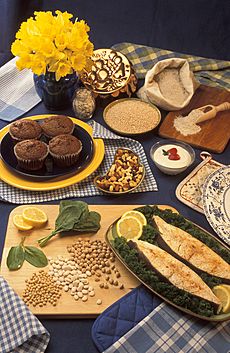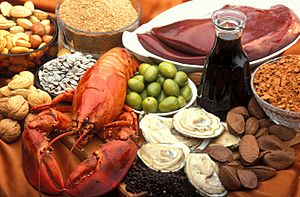Nutrient facts for kids

A nutrient is a special substance that your body needs to grow, stay healthy, and work properly. Think of it like fuel for a car, but for your body! Your body can't make some of these important substances, so you have to get them from the food you eat.
This article will talk about nutrients for animals, especially humans. We won't be discussing how plants, fungi, or bacteria get their nutrients here.
Contents
What Gives Your Body Energy?

Your body needs energy to do everything, from running and playing to just thinking and breathing. These nutrients are like the main power sources:
Carbohydrates
Carbohydrates are made of sugar units. They are your body's main source of quick energy. You can find them in foods like bread, pasta, fruits, and vegetables.
- Simple carbohydrates are small sugar units, like the sugar in fruit (fructose) or table sugar (sucrose). They give you quick energy.
- Complex carbohydrates are larger sugar units, like starch found in potatoes or rice. They give you energy more slowly and steadily.
Proteins
Proteins are like the building blocks of your body. They help build and repair muscles, skin, hair, and other body parts. When you eat protein, your body breaks it down into smaller pieces called amino acids. Some of these amino acids your body can make, but others, called "essential amino acids," you must get from food. Good sources of protein include meat, fish, eggs, beans, and nuts.
Fats
Fats are another important source of energy. They also help your body absorb certain vitamins. Fats are needed to keep your cell membranes working, protect your organs, keep your body temperature steady, and maintain healthy skin and hair. Just like with amino acids, there are some "essential fatty acids" that your body can't make, so you need to get them from your diet. Fats can be found in foods like oils, butter, avocados, and nuts.
Nutrients That Help Your Body Work
Besides energy, your body needs other nutrients to make sure all its systems are running smoothly.
Minerals
Minerals are tiny elements that your body needs in small amounts. They are important for many body functions, like building strong bones (calcium), carrying oxygen in your blood (iron), and helping your nerves work (potassium). Examples of minerals include copper and iron. You get minerals from a variety of foods, including fruits, vegetables, and dairy products.
Vitamins
Vitamins are organic compounds that your body needs in small amounts to stay healthy. They act like helpers for many chemical reactions in your body. For example, Vitamin C helps your immune system, and Vitamin D helps your bones absorb calcium. There are many different vitamins, and each has a special job. You can find vitamins in fruits, vegetables, and fortified foods.
Water
Water is super important! It's an essential nutrient because almost all the chemical reactions that keep you alive happen in water. Water helps carry nutrients around your body, removes waste, and controls your body temperature. Staying hydrated by drinking enough water every day is key to good health.
Essential Elements for Humans
Your body needs many different elements to function. Some of these are needed in larger amounts, and others are needed in very tiny amounts, called "trace elements."
- The four main organic elements: These are Hydrogen, Carbon, Nitrogen, and Oxygen. They are the basic building blocks of all living things.
- Quantity elements: These are elements your body needs in larger amounts, like Sodium, Magnesium, Phosphorus, Sulfur, Chlorine, Potassium, and Calcium. They are important for things like bone health, muscle function, and nerve signals.
- Essential trace elements: These are elements your body needs in very small amounts, but they are still vital. Examples include Manganese, Iron, Cobalt, Nickel, Copper, Zinc, Selenium, and Iodine. They help with many different processes, like making blood, boosting your immune system, and helping your thyroid gland work.
- Elements with possible roles: Some elements like Lithium, Boron, Silicon, Vanadium, Chromium, Arsenic, Strontium, and Molybdenum might also play a role in your body's health, though their exact functions are still being studied.
See also
 In Spanish: Nutrimento para niños
In Spanish: Nutrimento para niños

